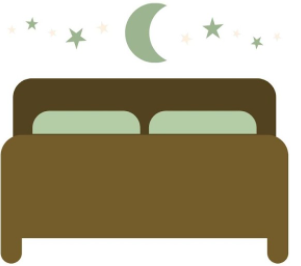How to optimize your sleep

According to the CDC, 1 in 3 adults do not get enough sleep.
February 15, 2022
With important dates such as graduation, the ACT, semester and AP tests looming, quality sleep often takes the back burner as our minds are focused on hours of preparation. However, during these times, it is as important as ever to get the most out of your sleep in order to perform well. Here are some tips to accomplish higher energy levels, a happier mood and overall better health.
1. Improve your sleep schedule
Creating a consistent sleeping schedule is one of the most important aspects you can implement to ensure you are getting the most out of your sleep. For most people this means getting around eight hours of sleep a night, going to bed and getting up at the same time every day. According to a study done by the Mayo Clinic, it is also key to “limit the difference in your sleep schedule on weeknights and weekends to no more than one hour [since] being consistent reinforces your body’s sleep-wake cycle.”
2. Maintain a healthy diet/eating schedule
Contrary to many people’s beliefs, sticking with a healthy eating routine is one of the biggest factors in determining quality of sleep. Of course, this means eating your fruits and vegetables, but it also means not eating too late in the night and refraining from going to bed hungry to avoid any possible discomfort. Staying away from caffeine at least four to six hours before bed is another action you can take to get a better night’s rest.
3. Limit naps
Despite being many people’s favorite pastime, napping has been proven to negatively impact sleep. According to the Sleep Foundation, “around 10 minutes is considered the best nap duration. This length of time allows you to catch a quick rest without entering slow-wave sleep and feeling excessively groggy after waking.” However, anything other than a short power nap is not recommended as sleeping during the day can confuse your internal clock, causing you to struggle to fall asleep at night.
4. Create a restful environment
Your surroundings while falling asleep can also affect the quality of rest. More often than not, a cool, dark and quiet room is the perfect formula to waking up well-rested. Furthermore, excessive exposure to light before bed (including blue light from screens) might also make it more challenging to fall asleep. According to the Cleveland Clinic, “bright light not only keeps you alert, but it is the strongest external cue that we have to signal our circadian rhythm.” Improve your sleeping environment by turning off intense lights, turning on a fan, limiting any noise and investing in a comfortable mattress and bedding.
5. Clear your mind
The last, and perhaps most important, piece of advice for a better night’s rest is to relax and clear your mind. Many underestimate the power of resolving any stress before settling in for the night. Some ways to accomplish this is to read, journal, meditate and listen to your favorite chill playlist. All of these strategies can help ease anxiety and ensure you sleep soundly throughout the night.








